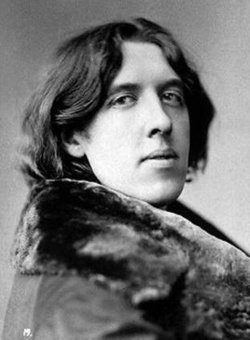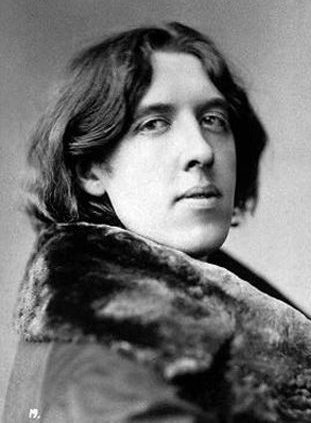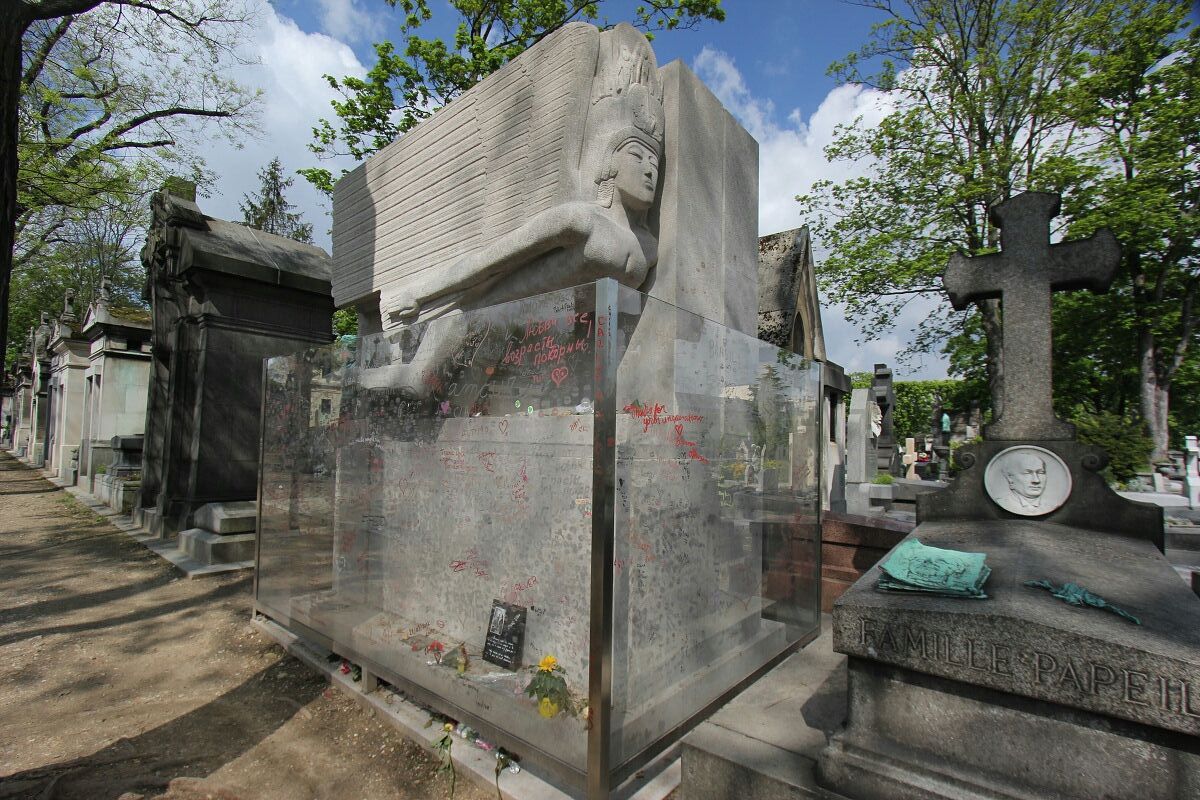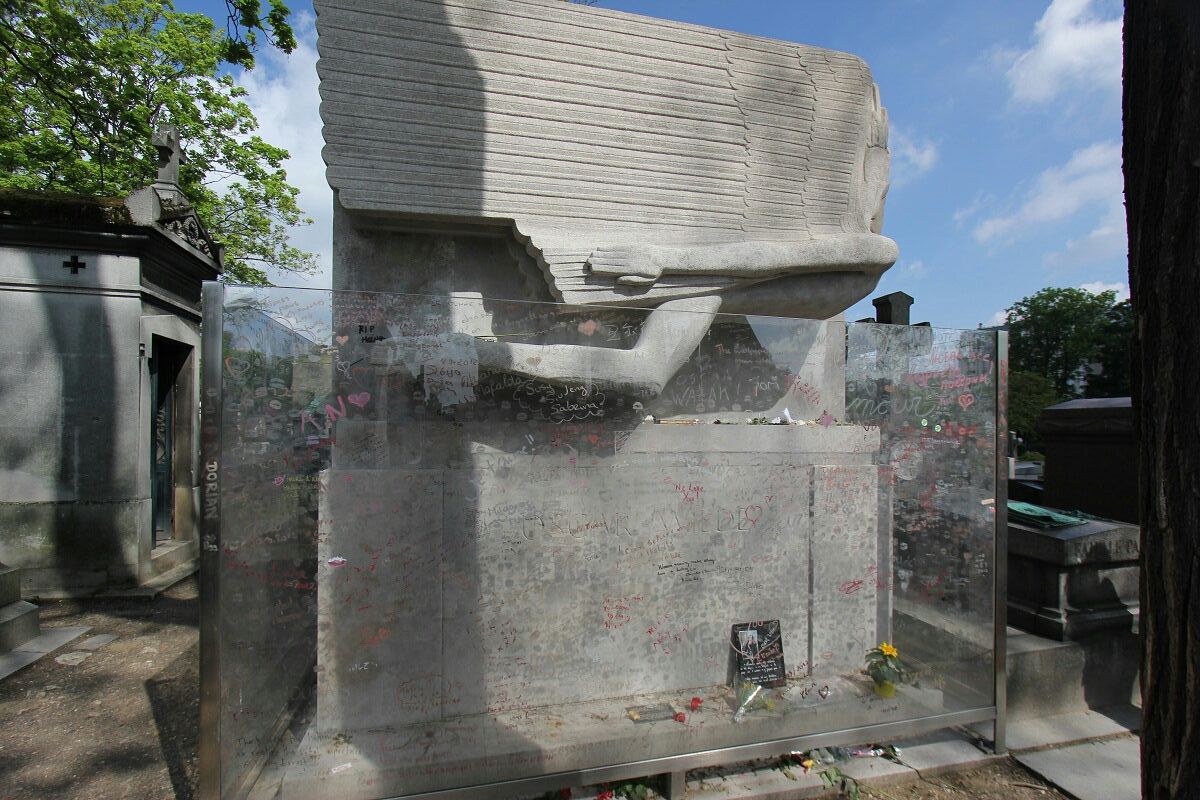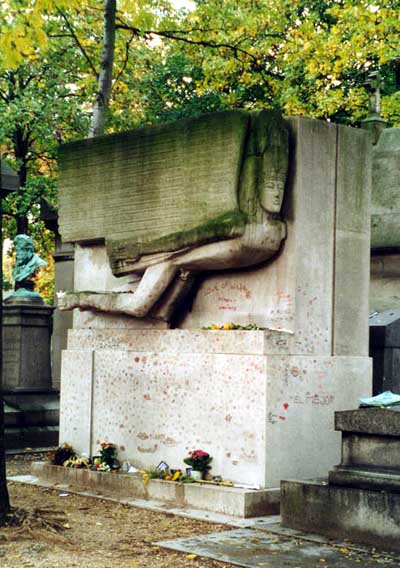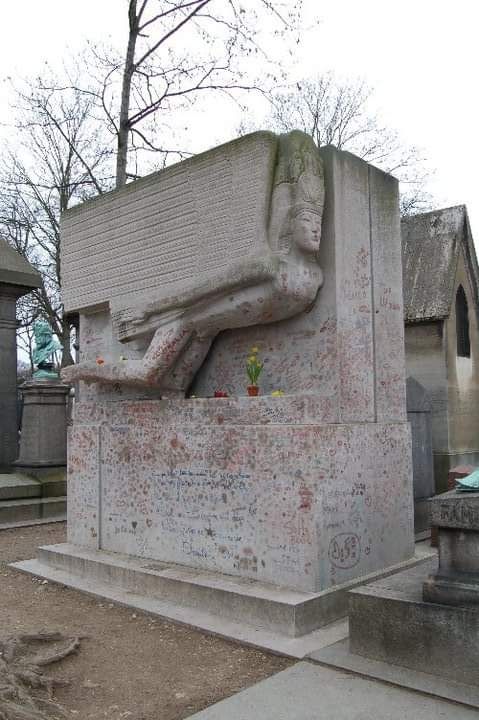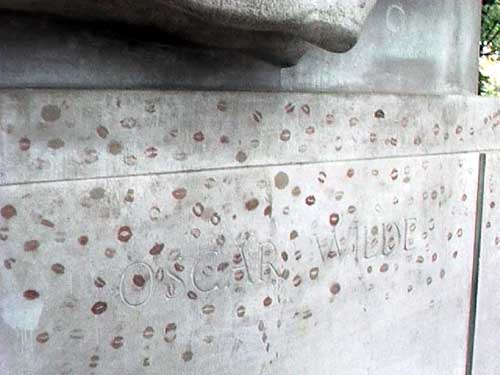His financial position was secured when he married wealthy Constance Lloyd. They had two sons. Wilde's plays, poems and sharp aphorisms about Victorian society made him a celebrity in the 1880s and 1890s, but he saw his career crash disastrously when he was jailed for two years at hard labor for the practice of homosexuality and incarcerated at Reading Gaol, a prison near London. He was kept in a 13 x 7ft cell with planks for a bed and assigned useless work while being ridiculed by guards. He lost custody of his children and the one visit from his wife was to inform him his mother had died. When Wilde was released from prison, he was penniless and in poor health. He began a self-imposed exile to the Continent, ending up in Paris, France. He shunned society and artistic circles, but his famous poem penned in prison, "The Ballad of Reading Gaol", was published. While on his death bed, a repentant Wilde requested a priest and converted to Catholicism. After an operation for ear problems, he became semi-comatose for days, then passed away from meningitis in a seedy Paris hotel at age 46. His remains were buried in Bagneaux Cemetery encased in quicklime so the corpse would decompose to only bones because of the temporary lease on the plot. The lime only tended to preserve the remains instead of skeletizing. Two years later a friend Robert Ross had the remains moved to the prestigious Paris cemetery Pere Lachaise. Taking three years, a tomb was sculpted by the famous American Jacob Epstein.
In a note of irony, his famous death bed quip about the wallpaper in his room at the run down Left Bank Hotel, D'Alsace pension house; the wallpaper has now joined Wilde and is gone. The hotel, today called L'Hotel, is a plush four star establishment and Wilde's room has been especially refurbished with vibrant blue-green frescos and commands a pricey amount to spend the night.
A hundred years have passed and much remains from this prolific author: His most famous works: "The Canterville Ghost", The Happy Prince and Other Stories, The Picture of Dorian Gray (his only novel), Lady Windermere's Fan, A Woman of No Importance, An Ideal Husband, The Importance of Being Earnest, and Salome. His most famous fairy tale was "The Happy Prince", collected in The Happy Prince and Other Tales. After his death, his friend Frank Harris wrote a biography; Richard Ellmann wrote Oscar Wilde (1987) and Neil McKenna wrote The Secret Life of Oscar Wilde (2003). Two exceptional films were made about his life: The Trials of Oscar Wilde (1960), starring Peter Finch and Wilde (1997) ,starring Stephen Fry. Fifty years after his death, the remains of his longtime friend Robert Ross were placed in his tomb.
During his life he was a living rebuke to English Victorian hypocrisy. He illuminated Europe and America with his poems, plays and essays. They are still being produced and read 100 years after his death. His quips, quotes and epigrams still sparkle: On a platform, rain pouring down waiting for a train to prison, he uttered, "If the Queen can't treat her prisoners any better than this, she doesn't deserve to have any."
His financial position was secured when he married wealthy Constance Lloyd. They had two sons. Wilde's plays, poems and sharp aphorisms about Victorian society made him a celebrity in the 1880s and 1890s, but he saw his career crash disastrously when he was jailed for two years at hard labor for the practice of homosexuality and incarcerated at Reading Gaol, a prison near London. He was kept in a 13 x 7ft cell with planks for a bed and assigned useless work while being ridiculed by guards. He lost custody of his children and the one visit from his wife was to inform him his mother had died. When Wilde was released from prison, he was penniless and in poor health. He began a self-imposed exile to the Continent, ending up in Paris, France. He shunned society and artistic circles, but his famous poem penned in prison, "The Ballad of Reading Gaol", was published. While on his death bed, a repentant Wilde requested a priest and converted to Catholicism. After an operation for ear problems, he became semi-comatose for days, then passed away from meningitis in a seedy Paris hotel at age 46. His remains were buried in Bagneaux Cemetery encased in quicklime so the corpse would decompose to only bones because of the temporary lease on the plot. The lime only tended to preserve the remains instead of skeletizing. Two years later a friend Robert Ross had the remains moved to the prestigious Paris cemetery Pere Lachaise. Taking three years, a tomb was sculpted by the famous American Jacob Epstein.
In a note of irony, his famous death bed quip about the wallpaper in his room at the run down Left Bank Hotel, D'Alsace pension house; the wallpaper has now joined Wilde and is gone. The hotel, today called L'Hotel, is a plush four star establishment and Wilde's room has been especially refurbished with vibrant blue-green frescos and commands a pricey amount to spend the night.
A hundred years have passed and much remains from this prolific author: His most famous works: "The Canterville Ghost", The Happy Prince and Other Stories, The Picture of Dorian Gray (his only novel), Lady Windermere's Fan, A Woman of No Importance, An Ideal Husband, The Importance of Being Earnest, and Salome. His most famous fairy tale was "The Happy Prince", collected in The Happy Prince and Other Tales. After his death, his friend Frank Harris wrote a biography; Richard Ellmann wrote Oscar Wilde (1987) and Neil McKenna wrote The Secret Life of Oscar Wilde (2003). Two exceptional films were made about his life: The Trials of Oscar Wilde (1960), starring Peter Finch and Wilde (1997) ,starring Stephen Fry. Fifty years after his death, the remains of his longtime friend Robert Ross were placed in his tomb.
During his life he was a living rebuke to English Victorian hypocrisy. He illuminated Europe and America with his poems, plays and essays. They are still being produced and read 100 years after his death. His quips, quotes and epigrams still sparkle: On a platform, rain pouring down waiting for a train to prison, he uttered, "If the Queen can't treat her prisoners any better than this, she doesn't deserve to have any."
Bio by: Donald Greyfield
Inscription
And alien tears will fill for him
Pity's long-broken urn,
For his mourners will be outcast men,
And outcasts always mourn.
Family Members
Advertisement
See more Wilde memorials in:
Explore more
Sponsored by Ancestry
Advertisement
